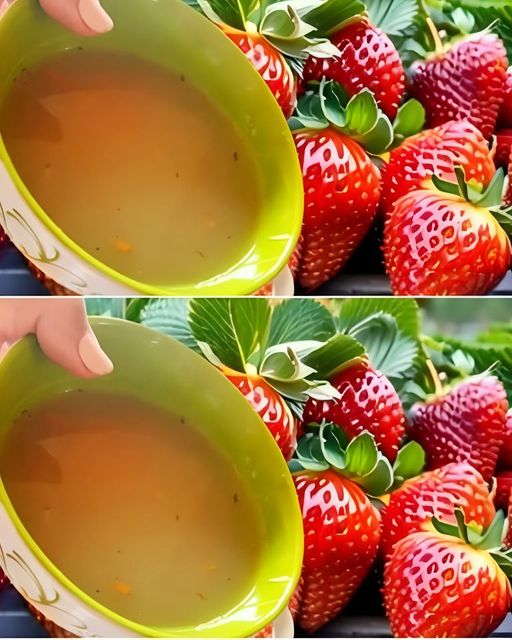ADVERTISEMENT
2. Fish Emulsion: A Nutrient-Rich Liquid Fertilizer
Fish emulsion is a natural fertilizer made from fish byproducts. It’s high in nitrogen, phosphorus, and trace minerals, making it ideal for boosting strawberry growth, especially in the early stages. The high nitrogen content promotes strong leaf and root development, leading to more flowers and fruit.
- How to Use: Dilute fish emulsion according to package instructions (usually 1-2 tablespoons per gallon of water) and apply it as a liquid feed every 2-3 weeks during the growing season. It’s especially useful when strawberries are flowering and fruiting.
3. Bone Meal: A Phosphorus Booster
Bone meal is a slow-release organic fertilizer made from finely ground animal bones. It’s rich in phosphorus, which is essential for flower and fruit development. Bone meal promotes healthy root systems and encourages larger, more abundant strawberries.
- How to Use: Sprinkle bone meal around the base of your strawberry plants before planting. Use approximately 1-2 tablespoons per plant and mix it into the soil. You can also apply it as a side dressing throughout the growing season to support fruiting.
4. Seaweed or Kelp Meal: A Mineral-Rich Supplement
Seaweed and kelp meal are both packed with essential minerals, trace elements, and natural growth hormones that promote strong, healthy strawberry plants. They help improve resistance to disease, stimulate root growth, and increase overall vigor, which leads to more bountiful harvests.
- How to Use: Mix kelp or seaweed meal into the soil before planting your strawberries, or use it as a side dressing during the growing season. For a liquid version, you can also make a seaweed tea by steeping dried seaweed in water for several days, then applying it to the soil.
5. Worm Castings: The Nutrient Powerhouse
Worm castings are another excellent option for organic fertilization. Rich in nitrogen, phosphorus, potassium, and beneficial microbes, worm castings enhance soil fertility and stimulate plant growth. They are especially beneficial for strawberries, as they promote strong root systems and help prevent diseases.
- How to Use: Mix worm castings into the soil before planting strawberries, or sprinkle a small amount around the base of the plants every few weeks. A light application will suffice, as worm castings are nutrient-dense.
6. Chicken Manure: A High-Nitrogen Powerhouse
Chicken manure is an incredibly nutrient-dense organic fertilizer, rich in nitrogen, phosphorus, and potassium. It promotes lush green foliage and robust fruit production. However, it’s important to compost chicken manure before use, as fresh manure can be too strong and may burn plants.
- How to Use: Compost chicken manure for at least 6 months before applying it to your strawberry plants. Once composted, apply it as a top dressing around the plants or mix it into the soil before planting.
How to Apply Organic Fertilizers to Strawberries
Applying organic fertilizer the right way ensures your strawberries get the nutrients they need for a successful growing season. Here’s how to do it:
- Prepare the Soil: Before planting, enrich your strawberry bed with a good layer of compost or other organic materials. This will ensure the plants have a healthy start.
- Fertilize in Stages: Organic fertilizers release nutrients slowly, so make sure to apply them regularly throughout the growing season. For example, feed your strawberries with a liquid fertilizer like fish emulsion once every 2-3 weeks.
- Top-Dress During Fruit Production: As your strawberries begin to fruit, give them a boost by applying more organic matter (such as compost or worm castings) around the base of the plants to encourage healthy fruit production.
- Water Appropriately: Water your plants consistently, but be sure not to overwater them, as this can leach nutrients from the soil. Organic fertilizers work best when the soil is kept evenly moist.
Additional Tips for Growing Luscious Strawberries:
- Mulch Your Strawberries: Adding a layer of mulch around your strawberry plants helps retain moisture, suppress weeds, and protect the roots from extreme temperatures. Organic mulch, such as straw or wood chips, also adds nutrients back into the soil as it breaks down.
- Rotate Your Crops: To avoid depleting the soil and reduce the risk of disease, rotate your strawberry patch every few years.
- Choose the Right Variety: Select strawberry varieties that are well-suited to your climate for the best results. Ever-bearing or June-bearing varieties can produce multiple harvests throughout the season.
Conclusion:
The secret to growing luscious strawberries lies in healthy, nutrient-rich soil. By choosing the right organic fertilizers, you can ensure that your plants thrive and produce the sweetest, juiciest berries. Whether you’re using compost, fish emulsion, or bone meal, these natural fertilizers work together to promote strong growth, vibrant blooms, and a bountiful harvest. Embrace the power of organic gardening, and soon you’ll be enjoying strawberries that taste like they came straight from a farm-to-table market!
So, plant those strawberries, nourish them with organic fertilizers, and get ready for a delicious and fruitful gardening season!
ADVERTISEMENT
